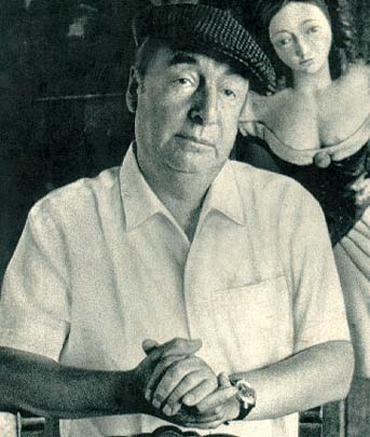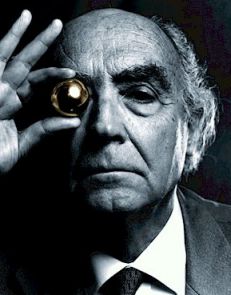
To protect his identity, I will call him G.
G is the student who makes you glad you became a teacher. (Sometimes you forget why.)
He was in my developmental composition class last year. Despite problems with punctuation and grammar, he wrote soulful, insightful essays. He is from Texas and has been speaking English since he was 10. I told him his writing reminded me of Pablo Neruda's. He surprised me by saying he knew Neruda's work. A couple of weeks later, G arrived at my office with a gift, a portrait he had painted of Neruda. Monochromatic, mostly grays, with splashes of bold color here and there, the portrait captures Neruda's spiritual bearing, it captures his wise eyes. G took my imaginative writing class the following spring. In this class, we read Neruda's Twenty Love Poems and a Song of Despair aloud. Each student read one of the poems. G read his Neruda poem in both Spanish and English. It was the first time I had ever heard Neruda's poetry read in Spanish.
This fall I ran into G once in a while. He visited me briefly, gave me a tape on meditation that I have yet to use. Then a long spell of not seeing him. You both get busy; you lose track. Then on Wednesday, he showed up at my office. He was practically breathless with excitement. He had heard I was teaching the junior fiction workshop in the spring, he said, and he wants to take it. He handed me a draft of a story he had been working on. He said his disk had broke; this was his only draft. Would I take it home and read it and tell him what I thought? And he would stop by next day? I said I would find time read it.
I read the draft late into the night. This was after I had read a pile of composition papers. The story is in its infant stages. Even so it has a haunting power. It has details that you feel in your heart and gut. The one I remember best: the boy reverently touching the "wrinkled body" of a tree. G's face burned red today as I told him how much I loved his story. He revealed he had been about ready to give up on his writing. He said the more he studied the technical aspects, the less he felt able to write, the less he wanted to write. (He is taking a techniques class now). He said he had decided he would chuck his idea to minor in creative writing. It was just not working out. Then he heard I was teaching the workshop; he would give it another try.
I told him that feeling of being unable to write is normal. He has momentarily lost his connection to why he needed to write stories in the first place. You can do that when you study technique too long; I really believe that. Creativity as a scholarly pursuit can only take you so far. It is like what Tim O'Brien said to us during his visit, I reminded G: You don't experience stories in your head but in your whole body. You are just disconnected from your heart and gut, I told him. It's temporary.
I think he believed me. He left on his own two legs. He is so much like Neruda, complicated, in love with his senses, in love with love. Ineffably sad. Happy beyond reason.
"Poetry," by Pablo Neruda
And it was at that age...Poetry arrived
in search of me. I don't know, I don't know where
it came from, from winter or a river.
I don't know how or when,
no, they were not voices, they were not
words, nor silence,
but from a street I was summoned,
from the branches of night,
abruptly from the others,
among violent fires
or returning alone,
there I was without a face
and it touched me.
I did not know what to say, my mouth
had no way
with names
my eyes were blind,
and something started in my soul,
fever or forgotten wings,
and I made my own way,
deciphering
that fire
and I wrote the first faint line,
faint, without substance, pure
nonsense,
pure wisdom
of someone who knows nothing,
and suddenly I saw
the heavens
unfastened
and open,
planets,
palpitating planations,
shadow perforated,
riddled
with arrows, fire and flowers,
the winding night, the universe.
And I, infinitesmal being,
drunk with the great starry
void,
likeness, image of
mystery,
I felt myself a pure part
of the abyss,
I wheeled with the stars,
my heart broke free on the open sky.
From Twenty Love Poems and a Song of Despair by Pablo Neruda:
Tonight I can write the saddest lines.
Write for example, 'The night is shattered
and the blue stars shiver in the distance.'
The night wind revolves in the sky and sings.
Tonight I can write the saddest lines.
I loved her, and sometimes she loved me too.
Through nights like this one I held her in my arms.
I kissed her again and again under the endless sky.
She loved me, sometimes I loved her too.
How could one not have loved her great still eyes.
Tonight I can write the saddest lines.
To think that I do not have her. To feel that I have lost her.
To hear immense night, still more immense without her.
And the verse falls to the soul like dew to a pasture.
What does it matter that my love could not keep her.
The night is shattered and she is not with me.
This is all. In the distancesomeone is singing. In the distance.
My soul is not satisfied that it has lost her.
My sight searches for her as though to go to her.
My heart looks for her, and she is not with me.
The same night whitening the same trees.
We, of that time, are no longer the same.
I no longer love her, that's certain, but how I loved her.
My voice tried to find the wind to touch her hearing.
Another's. She will be another's. Like my kisses before.
Her voice. Her bright body. Her infinite eyes.
I no longer love her, that's certain, but maybe I love her.
Love is short, forgetting is so long.
Because through nights like this one I held her in my arms
my soul is not satisfied that it has lost her.
Though this be the last pain that she makes me suffer
and these the last verses that I write for her.























